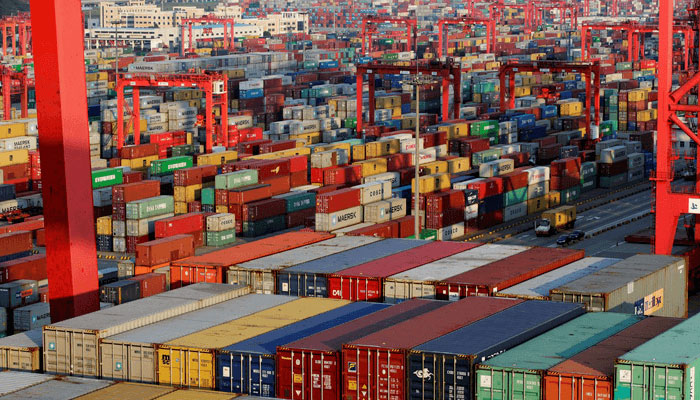Customs plan checking cargoes’ weight to verify import prices
The Directorate of Risk Management of Pakistan Customs issued instructions to all terminal operators regarding mandatory recording of weight of all types of import containers.
KARACHI: Pakistan Customs on Tuesday directed terminal operators to ensure weight logging of all the import containers being handled at ports as a step to check mispricing that causes hefty losses to national exchequer, sources said on Tuesday.
The Directorate of Risk Management of Pakistan Customs issued instructions to all terminal operators regarding mandatory recording of weight of all types of import containers.
The customs sources said previously containers’ terminals were bound to record weight of goods that were cleared under Afghan transit trade and transshipment. But, several incidents of misdeclaration by importers have been reported, especially those that were cleared under green channel. Various goods were allowed to be cleared on the basis of weight of goods.
Federal Board of Revenue Chairman Shabbar Zaidi has time and again said the government is seriously considering steps to check smuggling, under-invoicing and abuse of transit trade that increased around 44 percent to 93,732 containers in the last fiscal year of 2018/19.
A conservative estimate put under-invoicing at five billion dollars a year. Together with smuggling, the unfair trade practices lead to colossal losses of tax revenue.
Smuggled goods happen to meet more than half of the consumer demand for petroleum, tea, mobile phones, auto parts, and other major products in Pakistan, upending government’s revenue collection efforts and keeping industrial investments at bay, a body representing foreign investors said.
The sources said Pakistan Customs improved monitoring of imported goods and directed all terminal operators to record weights of all containers at the gate-out stage.
Therefore, the sources said terminal operators have been asked to provide weights at the time of gate-out and provide data to the customs authorities for re-checking the weight.
“The weight of all import containers should be recorded as this information is deemed vital for various risk management parameters,” the customs directorate said in a statement.
The directorate said the terminal operators and off-dock terminals were requested to ensure that no import container could proceed to gate-out clearance stage unless its weight is duly recorded and updated on Web-based One Customs.
The customs sources said the imports were sharply reduced during the first three months of the current fiscal year. Imports fell around 21 percent year-on-year to $11.249 billion in the July-September period – a main factor behind a sharp around 35 percent contraction in the quarterly trade deficit.
The tax authorities believed that the import could further be reduced by plugging loopholes in the system, especially through prevention of goods mis-declaration, they added.
Overseas Investors Chamber of Commerce and Industry said there is not a single study to identify the complete magnitude of illegal trade in the country. “But, it is estimated that approximately 60 percent of the total demand for products of over half a dozen sectors of the formal economy, including petroleum, tea, mobile phones and auto parts, is met only through smuggling,” Shazia Syed, president of OICCI said in a letter to the FBR chairman.
-
 Super Bowl 2026 Live: Seahawks Lead Patriots 3-0 After Defensive First Quarter
Super Bowl 2026 Live: Seahawks Lead Patriots 3-0 After Defensive First Quarter -
 Bad Bunny's Super Bowl Halftime Show: What Time Will He Perform Tonight?
Bad Bunny's Super Bowl Halftime Show: What Time Will He Perform Tonight? -
 Where Is Super Bowl 2026 Taking Place? Everything To Know About The NFL Showdown
Where Is Super Bowl 2026 Taking Place? Everything To Know About The NFL Showdown -
 Drake 'turns Down' Chance To Hit Back At Kendrick Lamar At Super Bowl
Drake 'turns Down' Chance To Hit Back At Kendrick Lamar At Super Bowl -
 Sarah Ferguson Had A ‘psychosexual Network’ With Jeffrey Epstein
Sarah Ferguson Had A ‘psychosexual Network’ With Jeffrey Epstein -
 Czech Republic Supports Social Media Ban For Under-15
Czech Republic Supports Social Media Ban For Under-15 -
 Khloe Kardashian Shares How She And Her Sisters Handle Money Between Themselves
Khloe Kardashian Shares How She And Her Sisters Handle Money Between Themselves -
 Prince William Ready To End 'shielding' Of ‘disgraced’ Andrew Amid Epstein Scandal
Prince William Ready To End 'shielding' Of ‘disgraced’ Andrew Amid Epstein Scandal -
 Chris Hemsworth Hailed By Halle Berry For Sweet Gesture
Chris Hemsworth Hailed By Halle Berry For Sweet Gesture -
 Blac Chyna Reveals Her New Approach To Love, Healing After Recent Heartbreak
Blac Chyna Reveals Her New Approach To Love, Healing After Recent Heartbreak -
 Royal Family's Approach To Deal With Andrew Finally Revealed
Royal Family's Approach To Deal With Andrew Finally Revealed -
 Super Bowl Weekend Deals Blow To 'Melania' Documentary's Box Office
Super Bowl Weekend Deals Blow To 'Melania' Documentary's Box Office -
 Meghan Markle Shares Glitzy Clips From Fifteen Percent Pledge Gala
Meghan Markle Shares Glitzy Clips From Fifteen Percent Pledge Gala -
 Melissa Jon Hart Explains Rare Reason Behind Not Revisting Old Roles
Melissa Jon Hart Explains Rare Reason Behind Not Revisting Old Roles -
 Meghan Markle Eyeing On ‘Queen’ As Ultimate Goal
Meghan Markle Eyeing On ‘Queen’ As Ultimate Goal -
 Japan Elects Takaichi As First Woman Prime Minister After Sweeping Vote
Japan Elects Takaichi As First Woman Prime Minister After Sweeping Vote




